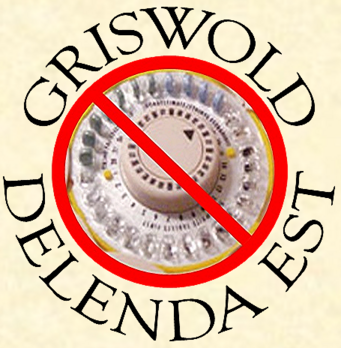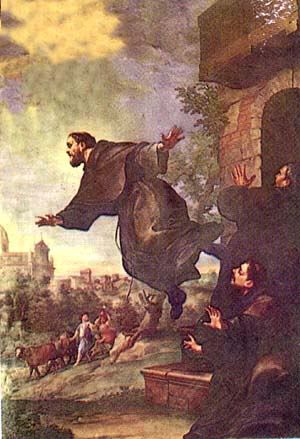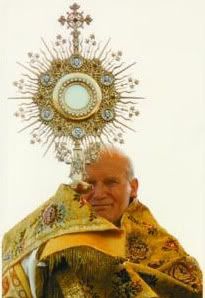If you see it in the Sun, it's true
Around this time every year, we can always expect a host of old conflicts to be drug out of the closet, like so many rusty crossbows with which to fling moldering bolts across the expanses of cyberspace, newspapers, and dinner tables. When to open Christmas presents? Whose family to visit when? Colored or just white lights? And most contentiously, does Santa Claus exist? I attended this afternoon the Central Ohio Symphony Orchestra’s annual Christmas concert, and something occurred to me that relates, unfortunately, to the last of these discussions. I remembered something that the bustle and inanity of college had caused me to forget.
I believe in Santa Claus.
Many people give good St. Nicholas short shrift. The calumnies piled upon his head seem to mount higher every year, and they grow so as to take on every nature of character. Childish, materialistic, deceitful, unnecessary, burdensome, foolish, dangerously secular, on and on. But Santa Claus, as we here in the United States have come to know the aged courier of Christmas cheer and gifts, is none of these things. I cannot speak for the sensibilities and beliefs of all peoples, but as a Catholic, I know that Santa Claus is a friend to myself and my traditions.
How, you ask, is Santa Claus my friend? No, I have not met him, at least not face to face; not yet. But we count many our friends with whom we have not conversed in person, be it ever or merely for many years. Take the saints as prime examples. I can know that Santa Claus is my friend because I can see the effects of the work he does. I see the Salvation Army ringers and their red pots filled with change. I see the delight and innocence on the faces of small children. I see the glistening lights, the jolly decorations, and the smartly wrapped packages – all surely human goods simply by virtue of their heartening aesthetic value if for no other purpose whatsoever. I see the trays and trays of cookies baked for his consumption, and the delight of all those among whom the “extras” are shared. I see the generosity of parents who can teach their children that gratitude should be directed not merely at certain individuals, but also to God, because good things are given to us in ways that we do not fully comprehend and from sources that we cannot fully identify.
But, objects the clausoclast*, children should be taught these things anyways; gratitude and enjoyment and generosity and happiness should not be dependent on silly and contrived human institutions; if we need traditions like these to understand Christmas, we don’t really understand Christmas.
I find such criticisms baffling. Man has never been capable of merely conjuring out of nothingness platonic virtues and divine graces. All of history, all of society, and most especially all of the Church’s history has been the story of man constructing ways in which to perpetuate and teach the truths that he knows to be true. And it has never been the case that man can do so using exclusively prescriptions revealed by God. The Protestant fears society, fears the natural proclivities of the people to tell their stories and live their lives and find happiness, because he has dabbled in Manichaeism and hates the flesh. He remembers that the spontaneous and organic celebrations of the masses were always the heart and delight of the Church’s popular piety, and he cannot abide anything similar. The Protestant, then, rejects institutions and traditions that are inadequately dour or not explicitly scriptural as pagan and impermissible. The Catholic, however, has a fuller memory, and recalls that the great institutions of Western society, the rites and rituals with which he has praised God for two millennia, are not in large part direct revelation, but are rather human creations, developed out of the timeless rites of ancient men and redeemed by their adoption by the Church and the infusion of the Holy Spirit. He recalls that the world and the Sabbath alike were created for man, not man for the world and the Sabbath. God has always permitted us to raise up institutions and customs with which to praise Him and pass on our knowledge, and He has blessed us greatly through them.
Santa Claus, or La Befana, or Pere Noel, or in whatever outfit you may find him anywhere around the globe, is no more inimical to the Catholic life than incense or chasubles or triptychs. He is one of the many mental and cultural tools to which we have recourse in our desperate attempt to preserve the mystery, happiness, and ethereal wonder of humanity’s existence. He would be a boon to mankind if he were never to bring another gift, as long as he could continue to bring to our hearts and minds a message of happiness and truth. Is he a replacement for the Christ child? No, nor would he ever accept such a title. Rather, he serves as one of the many messengers that Christ has sent out into the world to bring the message of His love, redemption, and mystery to mankind. The North Pole is really squarely in the world of fairyland, that Chestertonian realm in the twilight between human imagination and human understanding where we can most clearly glimpse the mysteries of God's mind.
Then there is the last, hopeless attempt: Santa Claus is lying. No, Santa Claus is not lying. A lie is intentionally to tell, to a person who has a right to know the information he seeks, a direct falsehood. As Francis Church argued 109 years ago, and as I continue to argue today, maintaining the existence of Santa Claus is not a falsehood, but is rather a metaphysical, not a purely ontological, assertion. Furthermore, the child to whom the existence of Santa Claus is proclaimed is not deprived of any knowledge he has any right to possess. Children do not need to know all things: a child does not need to know where babies come from, nor what certain words mean, nor what the human body looks like after being subjected to severe trauma or fire, nor etc. Children have a right, in fact, to be protected from such knowledge, because the time for their learning it has not yet come. They must learn joy before they learn to temper it with sorrow. You say that Santa Claus leaves avarice in his wake? No, sin leaves avarice in its wake, and you cannot assuage the power of sin by attempting to cast down the edifices that society has erected to insulate itself from sin’s power.
Do I exaggerate? No, I think not. Is there a Santa Claus? Yes, Virginia, there is a Santa Claus.
*Yes, I made this word up.
Labels: Society








1 Comments:
Christmas presents get opened on Christmas Eve. Santa (if you insist on him) only brings little things and does not wrap them.
:-P
I love you.
Post a Comment
<< Home